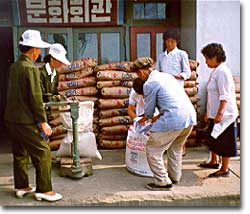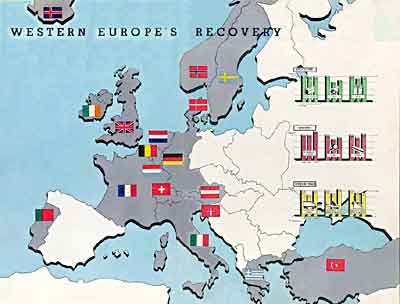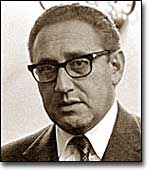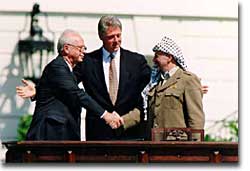11a. Foreign Policy: What Now?

The United States exercises its foreign policy through economic aid. For example, famine relief in North Korea provides not only humanitarian assistance but also a foothold for the development of democratic ideals and institutions.
George Washington's Farewell Address in 1789 contained one major piece of advice to the country regarding relations with other nations: "avoid entangling alliances." Those words shaped United States foreign policy for more than a century.
Today some Americans think that Washington's words are still wise ones, and that the United States should withdraw from world affairs whenever possible. In truth, however, the United States has been embroiled in world politics throughout the 20th century, and as a result, foreign policy takes up a great deal of government's time, energy, and money.
If isolationism has become outdated, what kind of foreign policy does the United States follow? In the years after World War II, the United States was guided generally by containment — the policy of keeping communism from spreading beyond the countries already under its influence. The policy applied to a world divided by the Cold War, a struggle between the United States and the Soviet Union.
With the collapse of the Soviet Union in 1991, containment no longer made sense, so in the past ten years, the United States has been redefining its foreign policy. What are its responsibilities, if any, to the rest of the world, now that it has no incentive of luring them to the American "side" in the Cold War? Do the United States still need allies? What action should be taken, if any, when a "hot spot" erupts, causing misery to the people who live in the nations involved? The answers are not easy.

The economic side of containment: the Marshall Plan was devised to prevent communist takeover of European nations by pumping American aid into the ailing economies and infrastructures of Western Europe.
Foreign Policy Goals
To investigate the nature of current United States foreign policy, the logical source is the State Department, whose job it is to define and direct it. Foreign policy goals include the following:
- Preserving the national security of the United States
- Promoting world peace and a secure global environment
- Maintaining a balance of power among nations
- Working with allies to solve international problems
- Promoting democratic values and human rights
- Furthering cooperative foreign trade and global involvement in international trade organizations
Examining these goals closely reveals that they are based on cooperation with other nations, although "preserving the national security of the United States" implies possible competition and conflict.
Who Makes Foreign Policy?

Henry Kissinger served as National Security Adviser and Secretary of State under Presidents Nixon and Ford. He was a key figure in articulating U.S. foreign policy during the Cold War.
As with all policy making, many people and organizations have a hand in setting United States foreign policy. The main objective of foreign policy is to use diplomacy — or talking, meeting, and making agreements — to solve international problems. They try to keep problems from developing into conflicts that require military settlements.
The President almost always has the primary responsibility for shaping foreign policy. Presidents, or their representatives, meet with leaders of other nations to try to resolve international problems peacefully. According to the Constitution, Presidents sign treaties with other nations with the "advice and consent" of the Senate. So the Senate, and to a lesser extent, the House of Representatives, also participate in shaping foreign policy.
The Secretary of State and many other officials of the State Department play major roles in setting foreign policy. The Secretary of State is usually the President's principal foreign policy adviser, and he or she is the chief coordinator of all governmental actions that affect relations with other countries.
The Foreign Service consists of ambassadors and other official representatives to more than 160 countries. Ambassadors and their staffs set up embassies in the countries recognized by the United States and serve as an American presence abroad. The embassies are part of the State Department, and they protect Americans overseas and are responsible for harmonious relationships with other countries.

Presidents can play a prominent role in the formation of foreign policy by brokering negotiations between disputing parties. Here, President Clinton meets with Palestinian President Yasser Arafat and Israeli Prime Minister Yitzhak Rabin.
The National Security Council, as part of the Executive Office of the President, helps the President deal with foreign, military, and economic policies that affect national security. It consists of the President, the Vice President, the Secretary of State, the Secretary of Defense, and others that the President designates. The National Security Adviser — who coordinates the Council — sometimes has as much influence as the Secretary of State, depending on his or her relationship with the President.
The Central Intelligence Agency (CIA), one of the best-known agencies that sets foreign policy, gathers, analyzes, and transmits information from other countries that might be important to the security of the nation. Although the CIA is notorious for its participation in "spy" work and "top secret" investigations, much of its work is public and routine. The CIA Director is appointed by the President and confirmed by the Senate.
United States foreign policy has changed dramatically from George Washington's day. Although Americans always pay attention to the advice of their revered founder, the world is of course not the same. The many people that shape American foreign policy today accept the fact that the United States is a member of a world community that cannot afford to ignore the importance of getting along.







